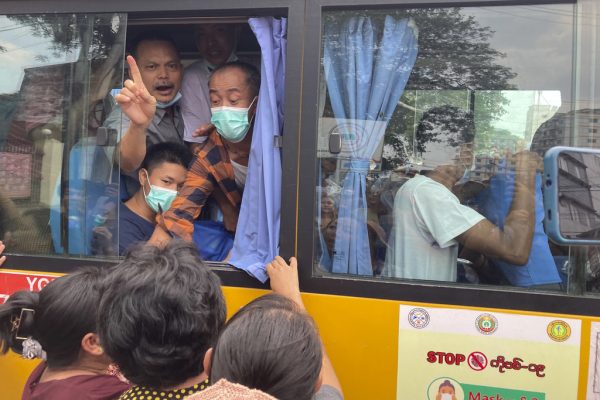
Myanmar’s military authorities have pardoned more than 2,000 people locked up under a law that makes it illegal to encourage dissent against the military.
In a junta statement cited by Agence France-Presse, the military said that it would release 2,153 prisoners to mark Kasone Full Moon Day, an important religious holiday that marks Buddha’s birth, enlightenment, and death. Junta chief Senior Gen. Min Aung Hlaing ordered the pardons “for the peaceful mind of the people and on humanitarian grounds,” the statement said.
This was followed by emotional scenes outside prisons in Yangon and other cities, where families welcomed the return of loved ones from the purgatory of Myanmar’s penal archipelago.
I’ve written several times already about the Myanmar junta’s prisoner releases, noting that they are a common feature of several other Theravada Buddhist countries, and do not say much about the future direction of the military’s policy. This is all the more the case because many of those released have been “ordinary” – which is to say, non-political – detainees.
Yesterday’s pardons were somewhat different in that the prisoners in question were all held under a single law – Section 505(a) of the penal code – that makes it illegal to spread comments that create public unrest or fear, or to spread false news. The charge, which carries a penalty of up to three years in prison, was used with abandon following the coup of February 2021, when largely peaceful protests erupted across the country.
As such, this amnesty does seem to transcend the recent prisoner releases announced on Independence Day and the Thingyan New Year holiday, and to represent a concession of sorts from a besieged and hated military administration.
In a statement, Ming Yu Hah of the rights group Amnesty International described the releases as “long overdue” and said that they should “mark the first step towards the immediate release of all individuals who have been arbitrarily detained for exercising their basic rights to freedom of expression and peaceful assembly or other human rights.”
While pardons may serve a tactical goal, however, they should not be taken as a sign that the military junta has shifted from its basic goals: the consolidation of its takeover at any cost.
In this regard, it is worth nothing that thousands still remain imprisoned on political charges for opposing the coup regime in some reform. According to the Assistance Association for Political Prisoners, a civil society group which is keeping a running count of those killed and detained by the junta, more than 21,000 people have been arrested since the coup; prior to yesterday’s pardons, 17,846 of them were believed to be in custody, including senior leaders of the ousted civilian government, including its leader Aung San Suu Kyi, as well as journalists, human rights defenders, and medical workers who joined post-coup civil disobedience strikes.
The military authorities have also emphasized that any released prisoners who “reoffend” will be jailed again, and there is no doubt they will be kept under close surveillance. As Amnesty’s Ming Yu Hah put it, this “effectively places a chilling effect on many people wanting to exercise their basic rights and freedoms.”
Nonetheless, it is likely that many, fresh from a grueling “political education” in Myanmar’s prison system, will emerge more dedicated to the resistance cause than ever. As one recently released political prisoner arrested in 2021 told The Associated Press, “we know what we have to do. And we learned a lot from prison. Using that, we will continue to fight for the revolution.”
Myanmar Junta Pardons More Than 2,000 Political Prisoners
Source: Frappler

0 Comments